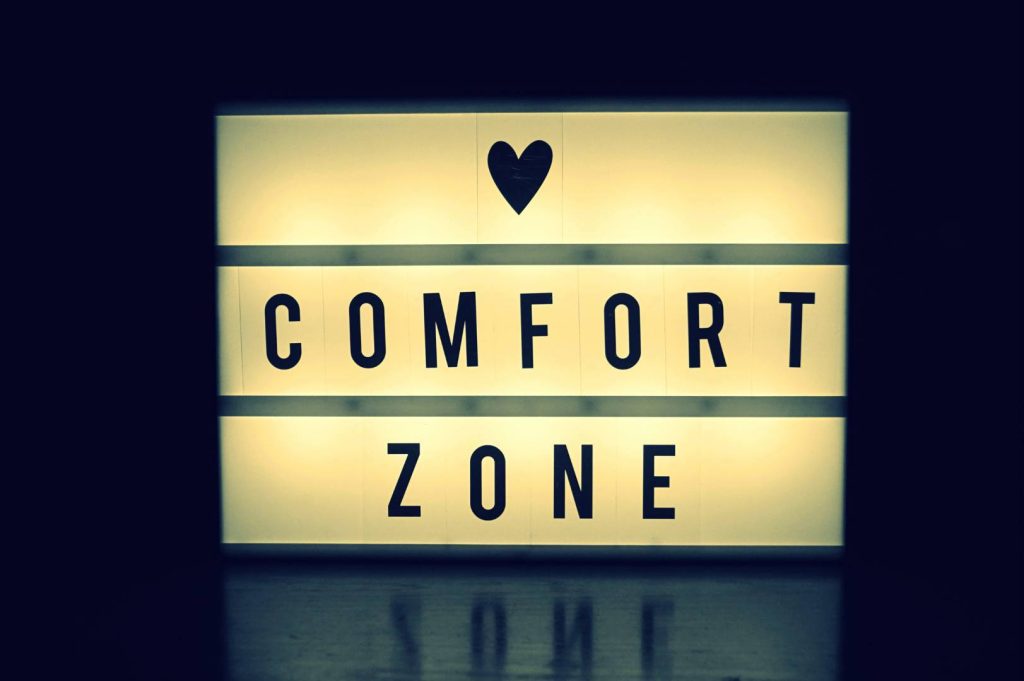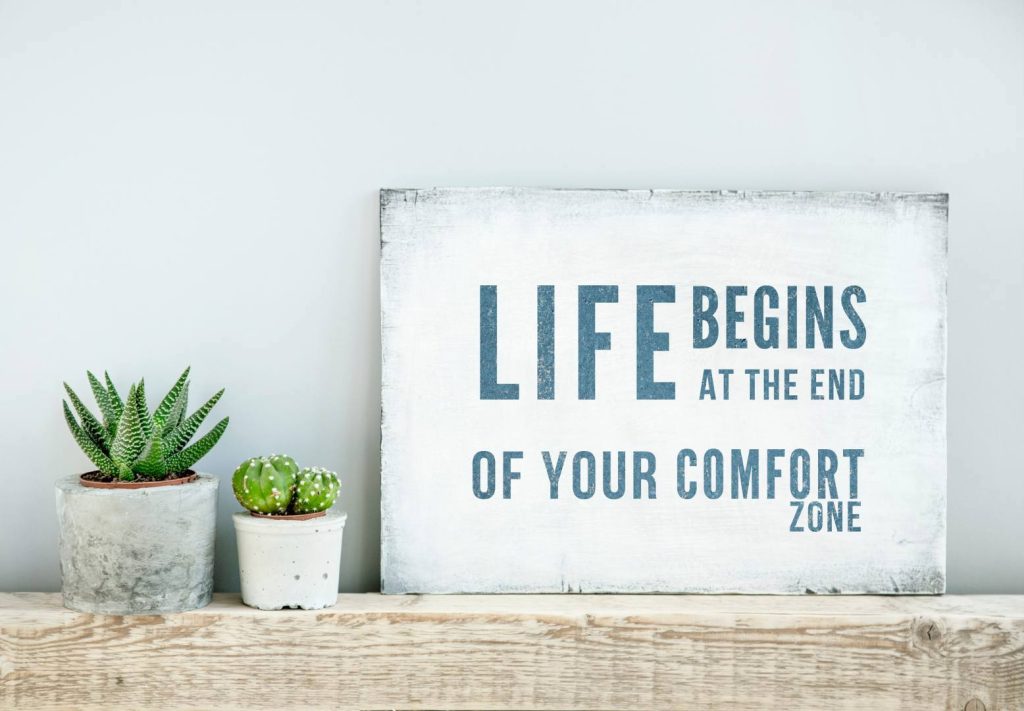Do you ever notice that little voice in your head that always seeks comfort? Picture this. You know you should go outside for a run, but it’s cold, wet, and windy. Your couch on the other hand is soft and comfy. Plus, the heating is on, you have a cupboard full of snacks, and your favourite TV show just came on.
‘Well, I could go for a run tomorrow instead. The weather may be better, and you did exercise two days ago’, your mind says. Oh dear, it’s too late. That voice has convinced you that staying at home all cosy is a better than going outside to exercise.
Can you think of similar situation?
Perhaps you were meant to write an essay, study, workout, do your taxes, start a business venture, or take up a new hobby. That was until your mind persuaded you to do something easier and less productive.
But why do our minds do that? Why do they seek comfort over the stuff that can improve our lives? And what can we do about it? Well, this article I’ll answer all your questions.
Why Does Your Mind Seek Comfort?

The simple answer to this question is that we evolved to seek comfort. Think of cavemen and women. Their priority was survival. They had to fight off predators, hunt for food, and search for shelter to stay out of the cold.
All the above took a tremendous amount of energy and effort. So, when they were safe in a cave with a roaring fire, and a healthy amount of food to eat, they were comfortable.
There was no need to go outside and face danger by hunting, fighting, or enduring the weather. At least temporarily. For our mind, comfort = contentment, safety, familiarity, rest, and little excursion.
Why wouldn’t our brains seek that? It makes sense. When we are comfortable, things are stress-free, life is good.
Many of us are lucky to not have to worry about where our next meal comes from, how we’ll stay warm, or be safe from danger. In general we have much easier lives compared to our hunter gathering days.
It’s effortless to find comfort these days. In fact, you might even say we have things too easy. But our primal, survival instincts haven’t changed. Your minds still want to protect you from discomfort and struggle at all costs.
Let’s look at what your mind is trying to protect you from in more detail.
Your Mind Wants to Avoid Difficult Emotions
Emotions like anxiety, anger, frustration, and fear are all challenging to face. When you have to do a difficult task, your crafty mind will try to avoid it because of the discomfort it will bring.
This is why we unconsciously procrastinate and avoid things that will cause distress. But we can’t blame our minds, can we? At the end of the day, they’re trying to protect us from experiencing difficult emotions.
Your Mind Will Prioritise Rest Over Excursion
Your mind will always try to save energy. Why? Because the primal part of your brain wants to preserve it for survival situations.
When you’re due to go to the gym or exercise, your mind automatically weighs up the pros and cons. Unnecessary excursion makes no sense to your mind. It wants to keep your body rested unless it’s necessary. But you don’t need to ration your energy these days.
It’s easy to listen to that voice in your heads. Deep down you know that working out is hard. Most people will avoid exercise as soon as any excuse or reason comes up, and your mind is an expert at creating them.
However, you know that regular exercise has many health benefits.
It’s worthwhile doing. So, get to it.
If you’re curious about other reasons you avoid working out, check out my article on why we procrastinate exercising.
Your Mind May Protect You from Failure
Failure is a huge part of life and it’s often when we learn our greatest lessons. Despite this, failure terrifies many people. They may fear the consequence of failing. Others might worry people will judge them. Some don’t want to let themselves or others down. Plus, the feeling of failure often brings up other negative emotions.
So, what does your mind do? It protects you from failure by creating reasons you shouldn’t even try in the first place. If you don’t even attempt something, how can you fail? Genius solution, right?
Is that how you want to go through life though? Do you want to never attempt anything for fear of failing.
Your Mind Prefers to Feel in Control
When you’re in a place that’s familiar, you feel safe and in control. That’s perfect for survival as you know the layout and it’s unlikely you’ll get any surprises.
But when you are in, or plan to go to a place that’s unfamiliar, your mind can assess it as a threat. This why people can suffer from agoraphobia, or social anxiety. For example, think back to a time you felt anxious about going somewhere unfamiliar.
Was it a different country, a dodgy part of a city, or a social gathering where you didn’t know many people? If you began to worry, overthink, and catastrophise, your mind would have prepared your body for threats.
You likely felt anxious and uptight because you were in fight-flight-or freeze mode. The primal part of your brain was anticipating danger and preparing your body. We get anxiety for a reason. It’s there for our benefit, believe it or not.
However, it becomes a problem if you start perceiving and anticipating threats unnecessarily. That’s when anxiety can take over someone’s life and prevent them from doing the things they enjoy.
How to Get Out Your Comfort Zone

Now you know why you unconsciously seek comfort. To recap, your mind wants to protect you from difficult emotions and failure. It will also avoid unnecessary excursion and places where you feel unsafe and out of control.
What if you don’t want to succumb to your mind seeking comfort? You’ve decided you want to stop these thoughts from influencing your actions. You don’t want to inhibit your life any longer. It’s time get out of your comfort zone and uncover your full potential.
So, what can you do? That’s exactly what I’m going to talk about next.
Become More Aware of Your Thoughts
The best way to this is mediate regularly. In doing so, you learn to observe the internal workings your mind and body. This includes watching your thoughts simply pass by, as opposed to getting caught up in them.
Mindfulness meditation is like brain training. You’ll cultivate self-awareness and increase your focus. You’ll also learn to regulate your body and control your emotions better. All whilst distancing yourself from unhelpful thoughts, preventing them from taking over.
To read more about the practice, check out my article ‘What is Mindfulness’.
“Once you’re aware of something, you can take positive action to make transformative change”
— Christopher Briggs
Challenge and Transform Your Thoughts
Mindfulness helps you to distance yourself from your habitual thinking. But, in CBT (Cognitive Behavioural Therapy) you learn to analyse and label destructive thoughts. This empowers you to transform them for your own benefit.
For example, if you have a thought like ‘if I travel alone, something bad will happen to me’. This would be catastrophic thinking. You’re assuming the worst will happen without any evidence.
Using CBT, you would rate how much you believe this thought and how likely it is to occur. You also note how this thought makes you feel.
Next you would ask yourself if there is another way to think about the situation. For example, you could think ‘as long I research, plan ahead, and stick to well-travelled routes, I will be safe’. Finally, you would rate this new thought and how you feel about it.
CBT is an effective therapy for anxiety, depression, and overthinking. It’s also useful to figure out what kind of thoughts are inhibiting you. Then you can change them until they become automatic.
“Your mind is a tool you can choose to use any way you wish.”
— Louise Hay
Become Disciplined
Yikes, bet you’re thinking that doesn’t sound fun, but here’s things, you CANNOT depend on motivation. Why? Because it comes and goes like an emotion. And as I talked about earlier, your mind will find any reason or excuse to not do something challenging.
It’s always going to be a battle. There will always be an easier, comfier option to choose. So, you must become disciplined if you want to be the best version of yourself possible. How? There is no secret solution or magic spell.
You can develop that mindset by pushing yourself every day to be better. In time, this will start to become like second nature. But what kind of things should you strive to do? That leads me to my final tip.
Do Uncomfortable and Challenging Things
The best way to become disciplined, uncover your true potential, and be more productive is to challenge yourself. Do difficult and uncomfortable things.
Learn to be comfortable in the uncomfortable.
You could be extreme and run a marathon, climb a vast mountain, or go sky diving, but what about the things you can do daily?
Go to the gym. Learn a new skill. See how many pushups you can do. Start a business. Study more, work harder at your profession. Or do something that scares you. Face your fears.
It doesn’t matter what it is. Just make sure you challenge yourself mentally, physically, or both! The more you do uncomfortable things, the easier ignore your comfort seeking mind.
Real growth and development happens when you step outside of your comfort zone.
“If it doesn’t challenge you, it won’t change you”.
— Fred DeVito
It’s Up to You to Take Positive Action

Now know why your mind seeks comfort. You also have some tips on how to develop a healthier and disciplined mindset. There is always a mindful way to be, rather than letting your mind dictate your actions.
Once you have that awareness, you can take positive action to make that change. You have the knowledge and the power. What are you waiting for?
Did you find this article informative? In what situations do you find yourself seeking comfort? Let me know in the comments below.
Take care of yourselves,
Chris from Mindful Way to Be



